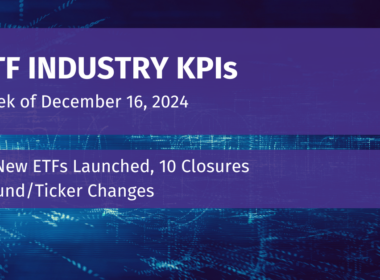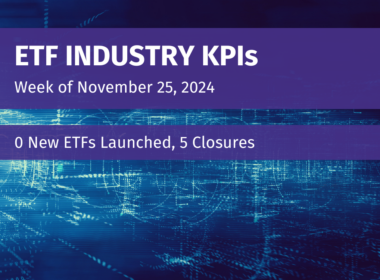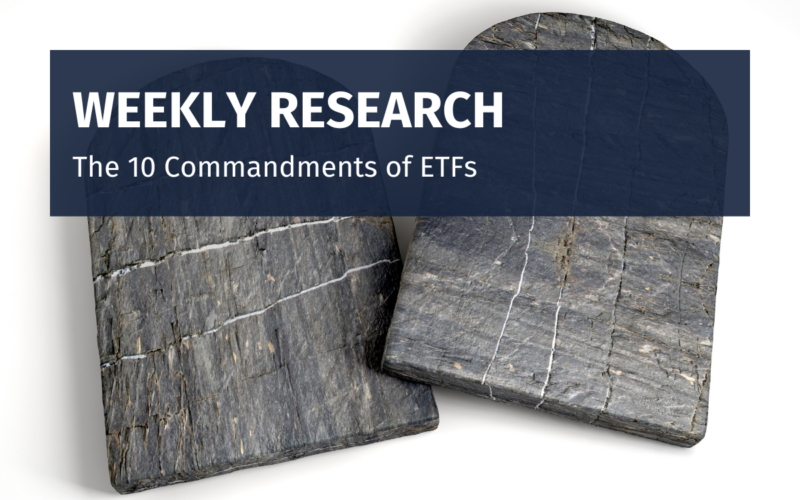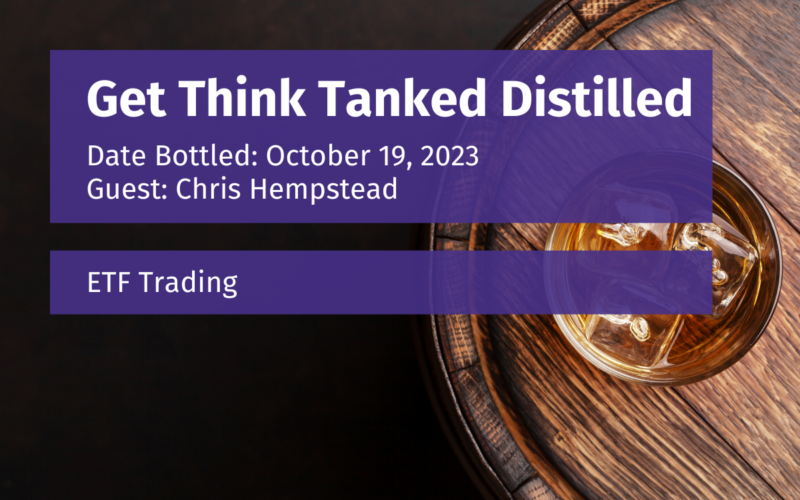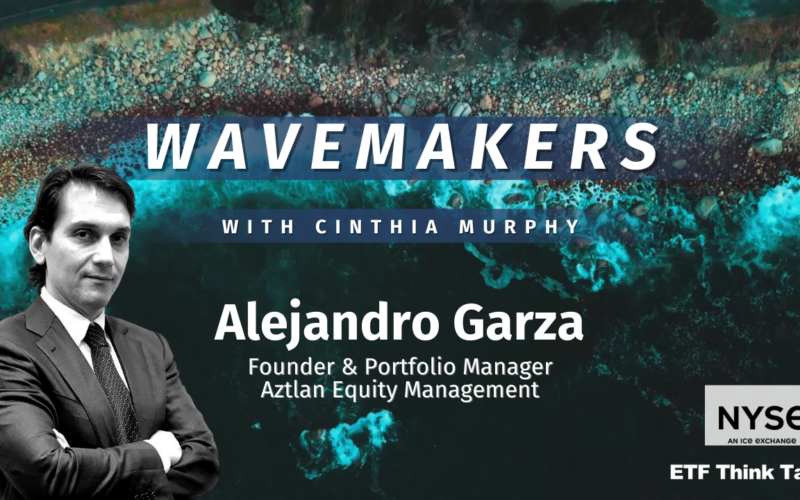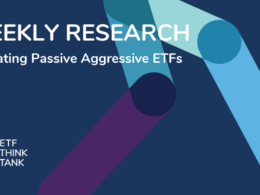The ETF industry is a highly regulated space both by design and by intent.
Some of these rules come down from regulatory agencies like the SEC and FINRA, who design and define the framework of what can and can’t be done in the ETF business. Others are unofficial rules of engagement that somehow we all agree upon for the sake of a wrapper – or an intentional purpose – we believe in.
So, what are these rules that govern our industry and our shared calling of sorts? Here are the bigger ones for ETF product and service providers:
The 10 ETF Commandments
- Thou shall not name an ETF in vain.
The SEC runs a tight ship when it comes to the language you can use in the name of an ETF. That’s because labels – names – matter.
This past September, regulators updated the 20-plus-year-old Rule 35d-1 also known as “The Names Rule” to strengthen its position on what it calls misleading or deceptive naming of investment companies (ETFs).
The rule specifically calls for the use of “plain English” in names – say exactly what you mean. It also singles out the ESG category as an offender when it comes to misleading claims in names. And more importantly, it requires that a fund’s name match its actual investments – if a fund name suggests a certain type of investment, at least 80% of the strategy’s assets should be invested accordingly as a fundamental policy.
According to the SEC, in the ruling amendment: “The role of the names rule remains important and distinct from other disclosure requirements. A fund’s name is not meant to supplant other required fund disclosure, and a name cannot communicate everything about a fund’s investments, risks, and other features… A fund’s name, however, is unique in several respects. It is typically the first piece of information that investors receive about a fund. Fund names offer important signaling for investors in assessing their investment options. Relatedly, incentives exist for asset managers to include terminology in fund names that is designed to attract investor assets.”
- Thou shall honor the industry’s roots.
It’s good practice to remember where we came from – if for no other reason, it reminds us of why we’ve worked so hard to get here.
First there were the closed end funds and then mutual funds, which popularized passive index investing, all great but with relatively high bars to entry and other inefficiencies. Then came ETFs as an offshoot of those investment products, structured in the same regulatory framework as mutual funds with a few exemptions under the Investment Act of 1940.
ETFs were a big step forward in a passive investing movement that had yet to reach the masses. ETFs opened up market access to any individual investor with a brokerage account, offering transparent, tradable, lower cost, liquid and tax efficient access to all sorts of segments and strategies.
Years of innovation – still ongoing – have vastly expanded that reach to new categories and investment styles (non-traditional index and active management) and to complexity. ETFs made investing everyone’s game, but it all began with a passive investing revolution back in the 1970s.
- Thou shall love your ETF above all others but beware of idols.
As product providers, this call to action isn’t about believing your ETF solves every investor problem. It certainly isn’t about making yourself into an idol of sorts.
This is about having conviction in the value proposition you bring to the table. Believe in and stick to your strategy. The ETF space is hugely competitive with plenty of product, plenty of providers and plenty of innovation vying for investor attention. If you aren’t eating your own cooking, chances are others may not want to bite either.
- Thou shall remember the end investor every day of the week.
Investors are the people we, as an industry, serve. Product development and the day-to-day management of an ETF strategy aims to deliver value to the investor, empowering them to invest better.
This isn’t just a lofty, magnanimous goal, it’s practical too. At the end of the day, losing sight of who ETFs ultimately serve is bad for business. It’s investors who decide what ETFs are actually delivering value to them. Success in this business – asset growth – hinges on that.
- Thou shall not transact in risk carelessly.
Risk can be great, but regulators believe moderate risk is better – or at least, carefully monitored risk.
In a recent review of the Investment Act of 1940, the SEC adopted Rule 18f-4, known as “the derivatives rule,” to better define, delineate and manage the use of derivatives in ETFs. The rule requires the implementation of a risk management program, board oversight and places limits on value-at-risk when derivatives are used in a strategy.
The new regulatory framework has broadened access to derivatives in ETFs, fostering a wave of complexity and product innovation. It has also reminded providers that if you are going to transact in derivatives, the SEC doesn’t joke around when it comes to protecting investors.
- Thou shall not covet your neighbor’s ETF.
The ETF industry is not a place concerned with intellectual property protections. That transparency flag we like to wave also means that ETFs are built out in the open, for everyone to see and to copy if they so choose.
However, if you see a great idea that belongs to someone else, it’s worth remembering that history hasn’t been kind to the copycats. On the contrary, we find that clone ETFs absent of any innovation rarely succeed in gathering assets. Sometimes we call that first-mover advantage – the first-of-a-kind ETF tends to lead its category as others follow.
So, don’t covet someone else’s great ETF idea. Focus on innovating, whether in access or in fees or in structure. Be an original.
- Thou shall not bear false witness about your ETF.
When it comes to talking about an ETF as a fiduciary, you could say mum is the word. Hyperbole aside, FINRA has strict rules around marketing and advertising of ETFs – it’s one of the main reasons we talk about the weather and compliance review with our morning coffees.
Most of the trouble centers on any claims about a product’s performance, but in truth, the rules make the business of talking and educating about an ETF tricky, to say the least.
The bad news is that it’s messaging mine field out there for product marketers, but the good-ish news is that there’s a compliance review team for that. Find yours, and good luck toeing that messaging line.
- Thou shall not kill the ETF team spirit.
ETFs are a team sport – it takes many participants across business lines to take an ETF from idea to launch to everyday trading and management. This is an industry where we work together as partners and as friendly competitors in broad collaboration.
There’s no going at this business alone. Be a good team player.
- Thou shall not steal from the end investor.
ETFs are known as low-cost wrappers, or at least lower cost than their competing investment products. That’s one of the hallmarks of this industry, and the bulk of assets today sit on ETFs with expense ratios barely in the double digits. Investors have come to expect ETFs to be cheap.
At face value, this means tolerance for greedy ETF managers is low. But we know cheaper isn’t always better when it comes to finding the right ETF, and we’ve found that while preference for low cost is strong, tolerance for fees has gone up as ETFs dab in complexity.
The takeaway here is that, when pricing an ETF, be mindful and competitive, and demand your price – just make sure you are asking for a fee that’s commensurate with the value you are offering.
- Thou shall be a steward of trust.
In the ETF business – and in asset management in general – we are all transacting in trust. That’s our main currency. Our relationships – and ETFs require a lot of relationships across the ecosystem – are built on trust. Our community is centered on trust. We really value it, and in truth, is one of the things that makes the ETF community rather special.
In ETFs, and in life, we know that trust, while slow to be earned, is quickly lost. So, guard it. Keeping those we interact with and serve in focus, and keeping efforts intentional in delivering value to everyday investors is one way to work towards that.
Disclosure
All investments involve risk, including possible loss of principal.
The material provided here is for informational purposes only and should not be considered an individualized recommendation or personalized investment advice. The investment strategies mentioned here may not be suitable for everyone. Each investor needs to review an investment strategy for his or her own particular situation before making any investment decision.
All expressions of opinion are subject to change without notice in reaction to shifting market conditions. Data contained herein from third party providers is obtained from what are considered reliable sources. However, its accuracy, completeness or reliability cannot be guaranteed.
Examples provided are for illustrative purposes only and not intended to be reflective of results you can expect to achieve.
The value of investments and the income from them can go down as well as up and investors may not get back the amounts originally invested, and can be affected by changes in interest rates, in exchange rates, general market conditions, political, social and economic developments and other variable factors. Investment involves risks including but not limited to, possible delays in payments and loss of income or capital. Neither Toroso nor any of its affiliates guarantees any rate of return or the return of capital invested. This commentary material is available for informational purposes only and nothing herein constitutes an offer to sell or a solicitation of an offer to buy any security and nothing herein should be construed as such. All investment strategies and investments involve risk of loss, including the possible loss of all amounts invested, and nothing herein should be construed as a guarantee of any specific outcome or profit. While we have gathered the information presented herein from sources that we believe to be reliable, we cannot guarantee the accuracy or completeness of the information presented and the information presented should not be relied upon as such. Any opinions expressed herein are our opinions and are current only as of the date of distribution, and are subject to change without notice. We disclaim any obligation to provide revised opinions in the event of changed circumstances.
The information in this material is confidential and proprietary and may not be used other than by the intended user. Neither Toroso or its affiliates or any of their officers or employees of Toroso accepts any liability whatsoever for any loss arising from any use of this material or its contents. This material may not be reproduced, distributed or published without prior written permission from Toroso. Distribution of this material may be restricted in certain jurisdictions. Any persons coming into possession of this material should seek advice for details of and observe such restrictions (if any).


